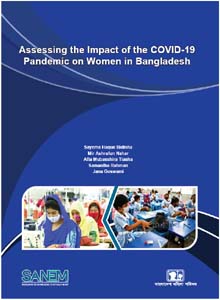Assessing the Impact of the COVID-19 Pandemic on Women in Bangladesh
 Citation: Bidisha, S. H., Nahar, M. A., Tiasha, A. M., Rahman, S., & Goswami, J. (2023). Assessing the Impact of the COVID-19 Pandemic on Women in Bangladesh. SANEM Publications, Dhaka, Bangladesh.
Citation: Bidisha, S. H., Nahar, M. A., Tiasha, A. M., Rahman, S., & Goswami, J. (2023). Assessing the Impact of the COVID-19 Pandemic on Women in Bangladesh. SANEM Publications, Dhaka, Bangladesh.
The COVID-19 pandemic has exacerbated socio-economic inequality globally, particularly in developing countries. Considering the disproportionate health, social, and economic dangers that women face, the UN Secretary-General issued a warning that the progress made towards gender equality may be undone. Women already faced profound disparities in gender in several areas before the pandemic. It is crucial to analyse gender-disaggregated data, adopt gender-driven policies, prioritise women’s rights, empower women’s agencies, and develop more resilient societies globally to address these concerns.
This qualitative study examines the impact of the COVID-19 pandemic on women in Bangladesh and their coping mechanisms. This study explores COVID-19’s effects on women in an array of scenarios, including child marriage, violence against women, employment, education, and health. The findings indicate that women experienced a significant loss of income and occupation during lockdowns, leading to food scarcity and various challenges. While women employed survival strategies such as taking loans and reducing expenses, their overall livelihoods became increasingly vulnerable. By conducting a total of seven FGDs (Rajshahi, Rangpur, Barisal, Chattogram, Dhaka, Mymensingh, Sylhet) over 39 districts, primary data collection and analysis have been done.
These FGDs produced notable outcomes. Bangladesh has developed some initiatives, both small and large, to deal with the pandemic. For instance, prejudice against women in the workplace, marital strife after divorce, early marriage, poor treatment in the healthcare sector, victims of clerical sexual assault, and the “curse of the dowry.” Another example is the sharp decline in girls’ school enrollment due to the pandemic. One more example is misinterpreting a religious phrase. Some recommendations can be suggested because of these findings as, financial support for postsecondary education, acknowledging the contribution of women’s proper implementation of law and digitalization of documents, changing the mentality of the parents and proper upbringing of children, recovery from the pandemic and the basic need for gipsy people, need of appropriate religious education, consciousness about reproductive health and nutrition, proper gender budgeting for reducing violence, changing mentality of women towards women empowerment, creating positive mindset about the transgender community, tarnishing indigenous people’s hardship in basic need.
In Bangladesh, the COVID-19 epidemic has disproportionately harmed women and girls, having a detrimental impact on their social, economic, and health conditions. Existing response strategies lack comprehensive measures to address gender-specific risks. To protect women’s rights and promote their empowerment, Bangladesh should prioritize gender-targeted policies, including job creation, improving data collection, access to information, protection against violence towards women, and support for childcare and mental health. To lessen the adverse impacts of COVID-19 on women’s employment, income, and safety, immediate action is required by the government.
